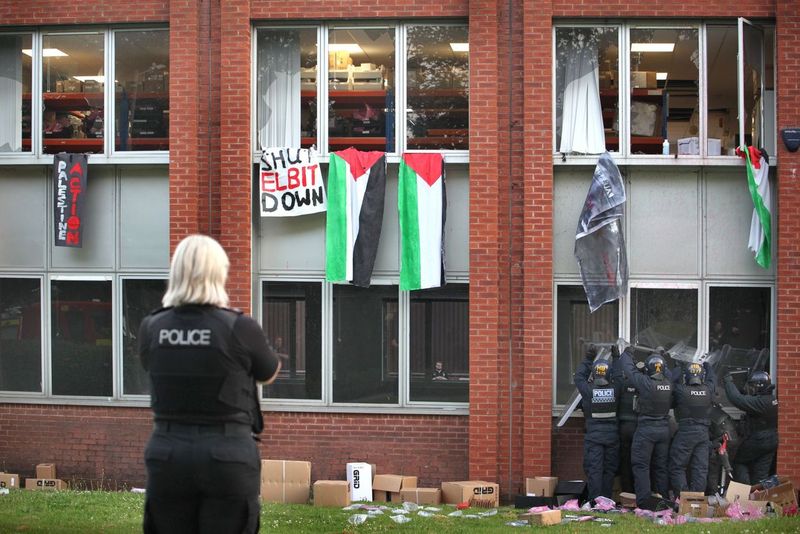Since coming to power five months ago, far-right President Javier Milei has subjected Argentine society to an ultra-neoliberal shock. On Thursday, May 9, unions held a second general strike against the “adjustment policies”, the Bases law and the imposition of austerity.
from Rapports de Force
Few buses or metros, no more taxis and trains, at least 700 canceled flights in empty airports, deserted classrooms from schools to universities, closed banks, little or no garbage collection and uncrowded shopping streets. In major cities in Argentina this Thursday. the general strike organized by the country’s leading union, the CGT, the two CTA trade union centers, and supported by the piquetero movements and various social and political sectors, was widely observed. “We feel that Milei is falling in public opinion and that more and more people are angry. We are not losing hope, but the economic and social situation is falling so quickly that it is difficult to organize the response”, explains Bast, an activist from the Federación de organizaciones de base autónoma, who on Thursday participated in a march towards the presidential house, with the entire piquetero sector.
The protest against Milei measures is gaining momentum
Unlike the first general strike of January 24 , the passenger transport sector was called to a stop for 24 hours. The previous time, the strike was from 7 p.m. to midnight, to allow more people to come to demonstrate in front of Congress, where the omnibus law was then under debate. This Thursday, almost all national and provincial transport unions called for a strike and the objective was no longer to organize a mass demonstration in the Argentine capital.
Hence, no short, medium or long distance passenger transport. No long-distance train either, nor any suburban train in Buenos Aires. In the capital, the taxi workers’ and metro drivers’ unions joined the call for mobilization. Air transport was almost completely at a standstill, with the national airline being one of the public companies that the government wishes to privatize, via the “Bases law” which replaces the “omnibus law” that Milei failed to impose on Parliament last February.
But the strike did not only concern transport. In addition to civil servants being called to stop work, it strongly affected banks, hypermarkets and shopping centers, health, where only emergency services were provided, ports, as well as education. Five national teaching unions, as well as provincial unions, called for mobilization. In universities, after the massive demonstrations of April 23 against budget cuts, where nearly a million Argentines took to the streets, all the unions joined the strike movement.
Falling wages, layoffs and rising poverty
This second general strike comes after the government succeeded in passing its “Bases” law in congress last week. This must now be examined in committee in the Senate. With more than 200 articles, it is a slightly lighter version of the omnibus law which contained more than 600. But it remains a ultraliberal chalice that Javier Milei wants to impose on Argentines, in addition to the devaluation of the currency by 50% last December, the liberalization of rents and the reduction in pensions. The text still provides for the privatization of several public companies (11 instead of 60 initially), including national airlines and railways and public radio and television. But it also includes an advantageous tax reform for foreign investors and a labor reform, not to mention expanded powers for the presidency in administrative, economic, financial and energy matters, at the expense of Congress, for a period of one year.
Even without the adoption of this deregulation text, for Argentines the economic and social situation has further deteriorated over the past five months, under the effect of government measures. “A real drop of 31% in budget items for pensions, of 87% for public works, of 39% for transport subsidies, of 76% for transfers to the provinces, of 18% for universities and of 13% for social programs. These are just some of the indicators which show that the adjustment is not paid for by elites, but rather falls on the most vulnerable sectors”, said the CGT and the two CTAs in an unprecedented joint declaration.
The government is trying to present this policy as beneficial by highlighting that inflation has increased less quickly in the month of April (+9%), although in the first quarter of 2024 it has increased to 51%. Another reason for Milei’s self-satisfaction: the first quarter recorded a positive budget balance. Certainly a first, but it was accomplished by bringing a sudden halt to public spending (minus 35%), the consequences of which are socially catastrophic. It also came at the cost of a growing economic recession, which the IMF estimates at nearly 4% for the year 2024, as well as the 21.2% decline in industrial production in one year, according to the statistics agency INDEC.
In the meantime, layoffs are increasing in the private sector, in addition to the 15,000 made by the government among state agency employees out of the 70,000 planned by the end of the year. And the poverty rate is exploding to historic levels. According to a study by the Argentine Catholic University, published on February 17, it stood at 57.4% in January, compared to 44.7% six months earlier. As for extreme poverty, it increased from 9.6% of the population in November 2023 to 15% in January 2024.
Despite the difficulties in organizing resistance to government measures, the second general strike of the year in Argentina could see consequences quickly. “If they don’t respond, we will go on a 36-hour strike”, warns Rubén Sobrero, of the Railway Union. We propose to the CGT to receive a mandate to call a 36-hour strike if there is no response to the 24-hour strike”.
~ Stéphane Ortega








